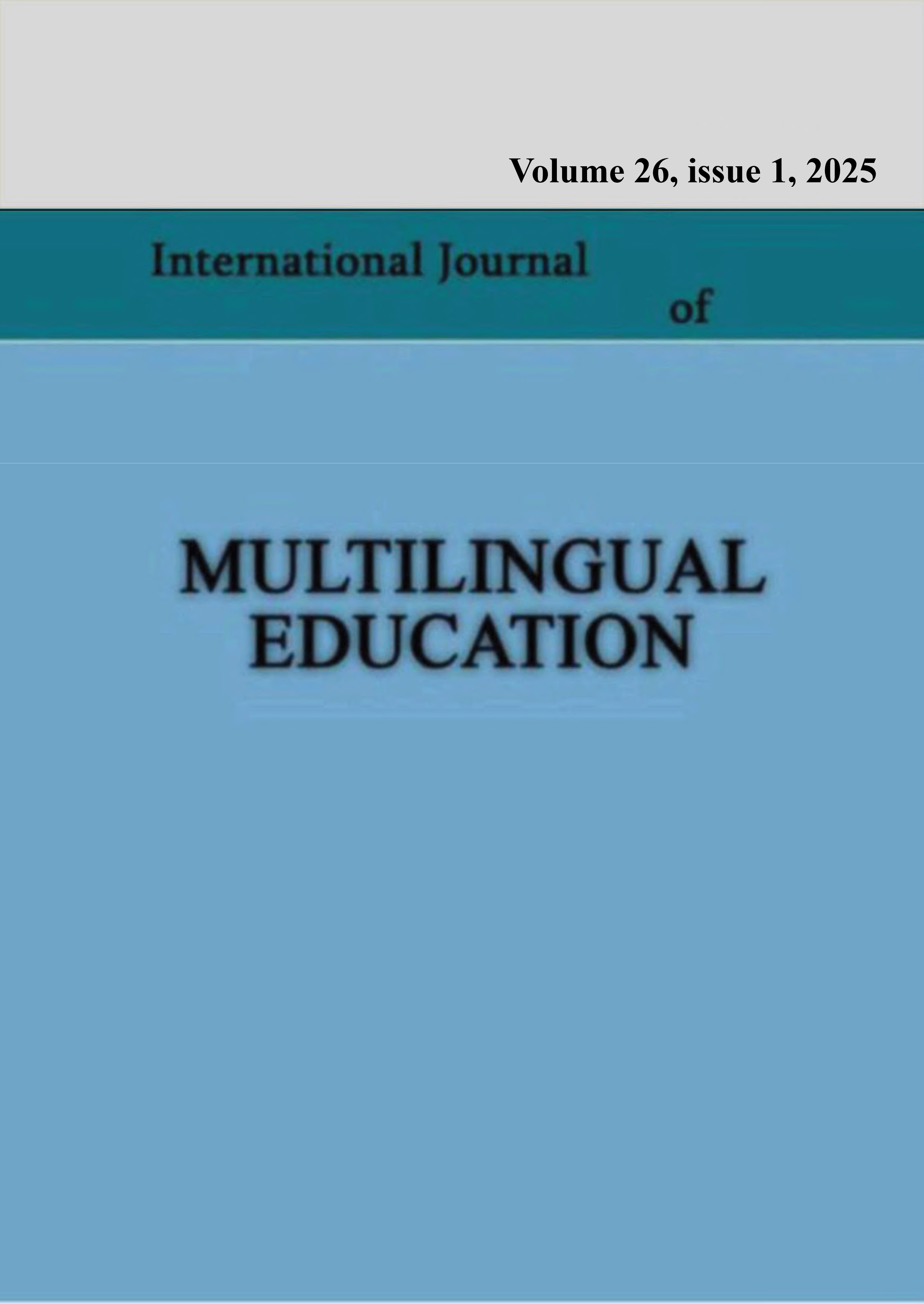Multilingual Education and Literacy in Ghana: Bridging Language Ideologies, Policy and Practice
DOI:
https://doi.org/10.22333/ijme.2025.9107Keywords:
Multilingual education, Language policy, Translanguaging, Educational equity, Cultural identity, GhanaAbstract
Ghana has a very rich linguistic environment that currently includes over 70 languages. While we have policies that support the use of the mother tongue in the classroom, we see the dominance of English, which is a legacy of the colonial past and a result of social expectation. We examined this issue through a review of 14 peer-reviewed studies and policy documents from 2015 to 2024, which we examined in terms of language beliefs, policy implementation, and real-time classroom experience.
What we found is a large-scale and consistent gap between what is put forth in policy and what is actually playing out in schools. English is going to language right from the start of a child’s school life. In addition, we see that this preference for a single language in the classroom, which we term monolingual teaching, is a factor in lower literacy levels, particularly among rural and under-served communities. Also, only 20% of our teachers are reported to be using what we term translanguaging, which is a practice of switching between languages to support learning.
At the same time, we see that in the few settings where we do have bilingual classrooms, we see that students report higher cultural identity, greater self-confidence, and better academic performance. Our study puts forth the idea that we should extend native language instruction past the primary level, make indigenous languages a requirement, and at the same time we put forth the idea that we should greatly increase support for teacher training in issues of translanguaging and culturally responsive teaching..
References
Agbozo, G. E., & ResCue, E. (2020). Educational language policy in an African country: Making a place for code-switching/translanguaging. Applied Linguistics Review, 12(4), 503–526. https://doi.org/10.1515/applirev-2020-2002
Amfo, N. A. A., & Anderson, J. A. (2019). Multilingualism and language policies in the African context: Lessons from Ghana. Current Issues in Language Planning, 20(4), 333–352. https://doi.org/10.1080/14664208.2019.1582945
Amponsah, S. (2023). Akan folklore as a philosophical framework for education in Ghana: International Review of Education, 69(1), 125–142. https://doi.org/10.1007/s11159-023-09993-x
Ansah, G. N. (2014). Re-examining the fluctuations in language-in-education policies in post-independence Ghana: Multilingual Education, 4 (1). https://doi.org/10.1186/s13616-014-0012-3
Anyidoho, A. (2018). Shifting sand: Language policies in education in Ghana and implementation challenges: Ghana Journal of Linguistics, 7(2), 225–248. https://doi.org/10.4314/gjl.v7i2.10
Arhin-Asamoah, J. (2023). Challenges encountered in the implementation of the National Literacy Acceleration Program (NALAP) in Abura Asebu Kwamankese District, Ghana: Library Philosophy and Practice. https://digitalcommons.unl.edu/libphilprac/7958/
Behrmann, T. (2018). Evaluating the effects of the mother tongue on math and science instruction: Educational Resources Information Center (ERIC). https://files.eric.ed.gov/fulltext/ED603513. pdf
Berson, M. J. (2020). Why Ghana is struggling to get its language policy rights in schools. The Conversation. https://theconversation.com/why-ghana-is-struggling-to-get-its-language-policy-right-in-schools-120814
Bisilki, A. K. (2018). Dilemmas of bilingual education in rural Ghana: A case study of the Nkwanta North District: Legon Journal of the Humanities, 29(2), 146–165. https://doi.org/10.4314/ljh.v29i2.6
Bronteng, J. E., Berson, I. R., & Berson, M. J. (2019). Public perception of early childhood language policy in Ghana: An exploratory study. Early Years, 39(3), 310–327. https://doi.org/10.1080/09575146.2019.1631759
Cenoz, J. (2017). Translanguaging in school contexts: International perspectives. Journal of Language, Identity & Education, 16(4), 193–208. https://doi.org/10.1080/15348458.2017. 1327816
Cummins, J. (2015). How can the legacy of exclusion be reversed? Identifying high-impact educational responses: Language and Education, 29(3), 272–287. https://doi.org/10.1080/09500782.2014.994528
Davis, E. K., & Agbenyega, J. S. (2012). Language policy and instructional practice dichotomy: The case of primary schools in Ghana. International Journal of Educational Research, 53, 341–354. https://doi.org/10.1016/j.ijer.2012.04.007
Edu-Buandoh, D. F., & Otchere, G. (2012). 'Speak English!' Prescription or choice of English as a lingua franca in Ghanaian schools: Linguistics and Education, 23(3), 301–316. https://doi.org/10.1016/j.linged.2012.06.003
Johnston, J., & Ksoll, C. (2022). Effectiveness of interactive satellite-transmitted instruction: Experimental evidence from Ghanaian primary schools. Economics of Education Review, 91, 102315. https://doi.org/10.1016/j.econedurev.2022.102315
Ngman-Wara, E. (2008). The influence of native language on Ghanaian junior secondary school students’ understanding of science concepts: African Journal of Educational Studies in Mathematics and Sciences, 3(1), 1–18. https://doi.org/10.4314/ajesms.v3i1.38602
Nie, J. (2023). Analyze the current situation of educational inequality in China: Journal of Education, Humanities and Social Sciences, 17, 199–215. https://doi.org/10.54097 /ehss.v17i.10493
Nkrumah, B., & Ansah, M. (2020). Comparative analysis of the most common language used for communication between basic school students in rural and urban areas in Ghana: International Journal of Humanities, Social Sciences and Education, 7(5), 1–12. https://doi.org/10.20431/2349-0381.0705007
Obeng, S. G. (1997). Analysis of the linguistic situation in Ghana: African Languages and Cultures, 10 (1), 63–81. https://doi.org/10.1080/09544169708717813
Owu-Ewie, C., & Eshun, E. S. (2019). Language representation in the Ghanaian lower primary classroom and its implications: The case of selected schools in the Central and Western Regions of Ghana: Current Issues in Language Planning, 20(4), 365–385. https://doi.org/10.1080/14664208.2019.1585159
The Role of Language in Ethnic Identity. (2012). The Role of Language in Ethnic Identity: The Case of Akwamu in Ghana: Sociolinguistic Studies, 6(1), 1–20. https://doi.org/10.1558/sols.v6i1.1
Downloads
Published
How to Cite
Issue
Section
License
Copyright (c) 2025 Kow Arkhurst, Prince Festus Eku-Hyia, Richmond Amoah-Yeboah, Isaac Mensah

This work is licensed under a Creative Commons Attribution-NonCommercial 4.0 International License.
Copyright (c) - Authors who publish with this journal agree to the following terms: Authors retain copyright and grant the journal the right of first publication with the work simultaneously licensed under a Creative Commons Attribution-Noncommercial 4.0 International License, which allows others to share the work with an acknowledgement of the work's authorship and initial publication in this journal. Authors are permitted and encouraged to post their work online (e.g., in institutional repositories or on their personal website) prior to and during the submission process, as it can lead to productive exchanges, as well as earlier and greater citation of published work (see The Effect of Open Access). Authors may enter into separate, additional contractual arrangements for the non-exclusive distribution of the journal's published version of the work (e.g., post it to a repository or publish it in a book), with an acknowledgement of its initial publication in this journal.

